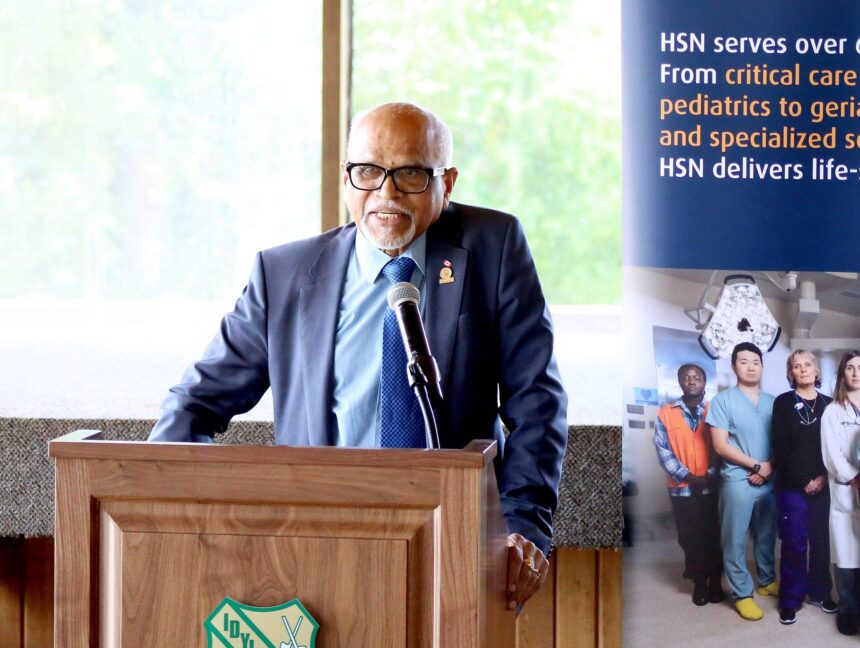On a windswept fairway just outside Sudbury, Dave Johnson takes a practice swing, his club whistling through the morning air. The 53-year-old mining supervisor isn’t just playing for par today—he’s playing for his son.
“Three years ago, I almost lost him to an overdose,” Johnson tells me, adjusting his stance. “The mental health unit at Health Sciences North saved his life. Now I’m here every year, rain or shine.”
Johnson is one of nearly 150 participants expected at next month’s “Teeing Off for Mental Health” tournament, an annual fundraiser that has quietly become one of the region’s most significant supporters of local mental health and addiction services. Last year’s event raised over $85,000, funding that organizers say is increasingly crucial as Sudbury, like many northern communities, grapples with escalating mental health needs.
The June 24 tournament at Timberwolf Golf Club marks the event’s seventh year, with proceeds supporting mental health and addictions programs at Health Sciences North (HSN), Sudbury’s regional hospital. For participants like Johnson, the connection is deeply personal—but the impact extends throughout the community.
“People don’t realize that when we talk about wait times or service gaps, we’re talking about real lives hanging in the balance,” explains Dr. Sarah Winters, who leads HSN’s addiction medicine service. “Events like this tournament directly fund programs that might otherwise not exist.”
According to the Canadian Mental Health Association, northern communities like Sudbury face unique challenges in mental health support, with higher rates of substance use disorders and fewer specialists than urban centers. A recent report from Public Health Ontario noted that northeastern Ontario has experienced opioid-related death rates approximately 50% higher than the provincial average since 2018.
Tournament organizer Michelle Labelle started the event after her nephew’s struggle with depression. What began as a small gathering of 40 golfers has evolved into one of the region’s premier charity tournaments, attracting corporate sponsors and participants from across Northern Ontario.
“We’re not just raising money,” Labelle says as we walk between the practice green and the clubhouse. “We’re challenging the stigma. When business leaders and community members come together like this, it sends a powerful message that mental health matters to all of us.”
The tournament’s growth reflects a changing conversation around mental health in workplaces and communities. Stacy Crawford, HSN Foundation’s development officer, notes that funds from last year’s tournament helped launch a peer support program for first responders and expand youth counseling services.
“What makes this tournament special is how the community has embraced it,” Crawford explains. “We have mining companies, local businesses, healthcare workers, and families affected by mental illness all coming together. That doesn’t happen every day.”
The fundraiser comes at a critical time. A 2022 assessment by the North East Local Health Integration Network found that despite increasing demand, mental health services in the region remain chronically underfunded. The report highlighted particular gaps in youth services and addiction treatment programs—precisely the areas targeted by the tournament’s fundraising.
Back on the practice green, I meet Samantha Toulouse, a 28-year-old teacher who credits HSN’s mental health services with helping her through a severe depressive episode during the pandemic.
“I’m a terrible golfer,” she laughs, after missing a simple putt. “But that’s not why I’m here. The counseling program they offer helped me find myself again when I was completely lost. How do you put a price on that?”
The tournament operates with minimal overhead—nearly 90% of funds raised go directly to programs, according to organizers. Local businesses donate prizes and refreshments, while volunteers handle much of the event management.
Tournament day will feature a silent auction, dinner reception, and testimonials from community members who have benefited from HSN’s mental health services. This year’s honorary chair is retired NHL player and Sudbury native Andrew Brunette, who has spoken openly about mental health challenges following his playing career.
“We’re aiming to surpass $100,000 this year,” says Labelle, looking out over the course. “But even more important is keeping the conversation going. Every person who registers is saying ‘this matters to me.’ That’s how change happens.”
For Dave Johnson, the tournament represents hope in a region where mental health resources have traditionally been stretched thin. His son, now 25, works as a peer support specialist helping others navigate recovery.
“People up here don’t always ask for help,” Johnson says, zipping up his golf bag. “But events like this show that it’s okay to struggle, and that your community has your back when you do.”
Registration for the tournament remains open until June 10, with individual spots available for $195 and foursomes for $750. More information is available through the Health Sciences North Foundation website or by calling 705-523-7130.
As morning practice winds down and participants head toward their cars, Johnson pauses for a final thought.
“You know what I love about golf? Every hole is a fresh start. Mental health recovery works the same way. Some days are bogeys, some are birdies. But you keep playing, one shot at a time.”






